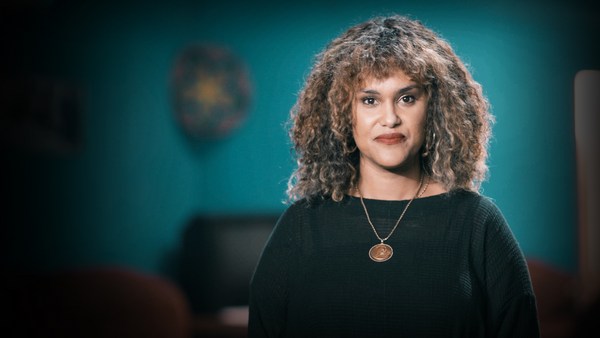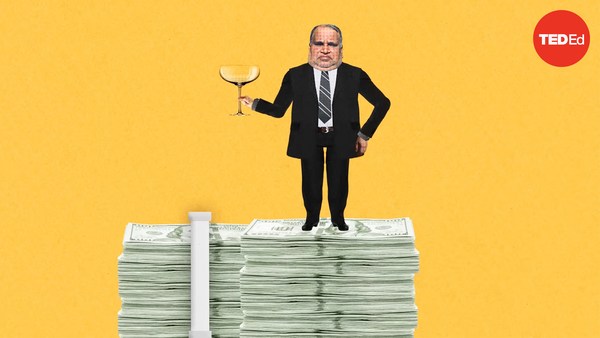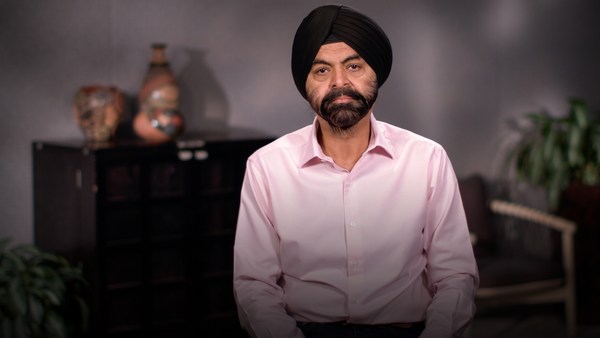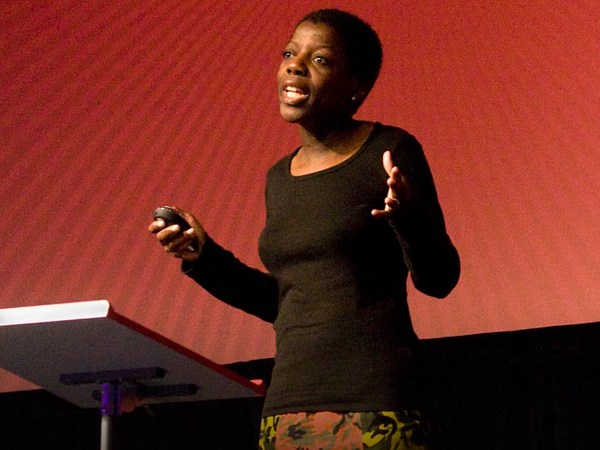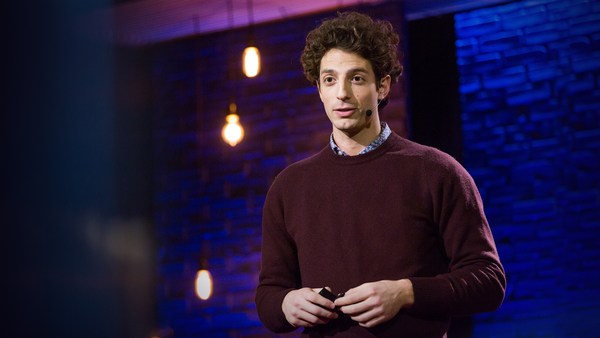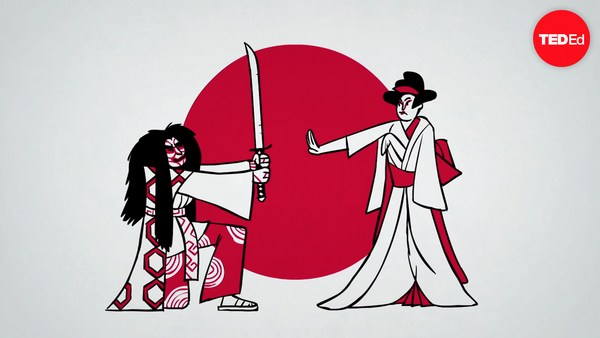I was supposed to go in the very first session. And I had a plan. And that plan was I'd do TED, I'd see Vancouver, I'd chill out, I'd get this thing done, then I’d relax. I'd listen to other people's speeches, rob their best ideas, bring them home and sound incredibly, incredibly brainy. And then your man, Chris, rings me last weekend. He says, "You know that last thing, the first thing? Why don't you go last?" I'm like, "Oh, man." That brought to mind the words of the great American philosopher, Mike Tyson.
(Laughter)
Who said of plans, "Everybody has a plan until they get a punch in the face."
(Laughter)
And of course, you know, doing the last gig at TED, it's not about the pressure, that's not the problem. The pressure isn't the problem. The problem is the sobriety.
(Laughter)
But the speeches have been amazing, right? And if I could kind of encapsulate them all, it's really been about, as far as I can see, the pace of change and what that's doing to us demographically, politically, socially, economically. Extraordinary stuff.
And I'd now like to quote from a great liberal, democrat, a friend of TED, Vladimir Lenin.
(Laughter)
Who said of change and crises that there are decades when nothing happens and there are weeks when decades happen. And we’re living through those weeks, you get that feeling, and it’s really difficult to know where to start to think about these ... How do you analyze this stuff? Now, if I was an American economist or a Canadian economist or, God forbid, an English economist -- Actually the nice thing is they're not good at economics anymore. It's so beautiful, isn't it?
(Laughter)
Praise the Lord. Praise the Lord.
(Laughter)
But I'd come here armed with the tools of my trade. You know, the graphs and the charts and the maths and all that good stuff. But I'm an Irish economist, so I'm only going to come here armed with some lines and some verses of poetry.
(Laughter)
Yeah.
(Applause)
Thank you very much, the poets in the corner. We're a small minority.
(Laughter)
But perfectly formed. Now, I want to talk to you about a poem that was written in 1919 called "The Second Coming" by W.B. Yeats, our national poet. And the fascinating thing about crisis, so in 1919, 100-odd years ago -- the fascinating thing about crisis is that every generation feels that their crisis is the big one. We're kind of narcissistic about it, right? But every generation experiences crisis. Every generation, our parents, our grandparents, they all did. How we deal with the crisis is the definitive issue for our generation.
So Yates is sitting in Dublin, 1919. He's trying to make sense of the world, right? His world is changing rapidly. The German Empire is over. The Austrian Empire is over. The Ottoman Empire is over. Ireland has declared a war of independence against Britain, which, if you were a betting man, you wouldn't really give us, not our side, you wouldn't have given us good odds. And Yeats is trying to figure out not just what is happening, but what is likely to happen.
And he writes these words, and just listen to them and imagine they were written now. “The Second Coming.” “Turning and turning in the widening gyre / The falcon cannot hear the falconer; / Things fall apart; the centre cannot hold; / Mere anarchy is loosed on the world, / A blood-dimmed tide is loosed, and everywhere / The procession of innocence is drowned; / The best lack all conviction, the worst / Are full of passionate intensity.”
Just let those words lie. “Things fall apart, the best people lack conviction, the worst are full of passionate intensity.” Now, this is Yeats writing 100 years ago, and the historical rhythm and repetition is clear, I think, to all of us. But what really interests me as an economist is the contrast between what Yeats, the poet, was saying back then and what all the economists, the people who were employed to think about the future, were saying.
So, Yeats said, "The center will not hold." Three years after he wrote this, three years, three to four years, Mussolini was in power in Italy, Stalin was on the ascendancy in the Soviet Union and a little, small, unprepossessing man with a mustache called Adolf Hitler had just orchestrated a putsch in Munich. Yates was right. Yates was right.
And what were all the economists saying back then? The people who were paid to think about the future? They were all saying, "Oh, don't worry, we'll go back to the gold --" Not all, the vast majority -- "We will go back to the gold standard. We'll trade again. Germany will pay all its reparations and the First World War will have been the war to end all wars." How wrong could they be?
So what's always bugged me is why did the poet get things so right at a tipping point, and the economists get things so wrong? And I believe it is because the poet, the artist, the musician, these types of people give themselves, at a tipping point, the permission to think unconventionally. They see the world differently.
Do we value the unconventional thinker? Do we? And maybe the best way to answer that question is to go all the way back to school, to the place we begin to learn.
Now just bring yourselves back to your school days. Remember yourself at 13. Just remember the person you were. I remember the classroom. I remember the teachers, I remember the building, I remember the break, I remember everything. I remember the sports day, I remember the whole thing. In fact, there's a gang of five of us who've hung around since we were in school. And those five lads I was in school with spent the entire of our school years looking out the window They just didn't get it. They just didn't get school at all. And they've gone on to have incredibly successful lives in their own individual ways. But their intelligence, their form of intelligence, was not recognized.
And as we get older, we realize the world is full of various different intelligences. But back in school, we only really recognized one type of intelligence. And that was like the little kid who could come in -- big, wide-eyed kid, right? -- he’d come in, could absorb all this information into his head or her head, opened some sort of weird compartment, stuff it all in, stuff, stuff, stuff it all in. And then, in early June, when the weather gets good in Ireland -- and I presume it’s the same all over the place except for Vancouver -- write like bejesus, right? That was the type of intelligence we rewarded. It's like getting a prize for being a walking filing cabinet, right?
(Laughter)
That's one intelligence. It is an intelligence, but it's only one type of intelligence. And what about all the other kids over here, the kids who didn’t get it? ... They weren't not only recognized, their intelligence was besmirched, humiliated and belittled.
My daughter is dyslexic. She hated every single day of school. And as a result of this system, we have a strange thing in our society where there are thousands of incredibly clever people who left school feeling stupid. But the corollary is also the case. There are many actually quite stupid people --
(Laughter)
You know where I'm going -- Who left school feeling very, very clever. And those kids, when they were really good kids, they used to get the best marks in school. In Ireland, we have a little star over the right. And of course, the teacher told them they were clever, and the priests, the nuns, and of course, their mummy told them they were clever, right? If you want to get a sense of an Irish mummy, an Irish mummy is the sort of mother that makes an American soccer mom look unambitious.
(Laughter)
I know, I have one, right? I am the son of a retired schoolteacher. If anybody else in the room is the son or daughter of a schoolteacher, we can form a self-help group later on to deal with our trauma, right?
But those sort of kids, they do extremely, extremely well in school, then they do very, very well in college. And then they get on, because they do very, well, on to the graduate trainee programs and they join the big banks, and they join the big firms and they join insurance companies, they join the consultancies, and they're on the fast track. They’re on the fast track career-wise.
And something weird happens as their career progresses. We like to think that we surround ourselves with people who think differently, but we don't. There's something called confirmation bias. We actually surround ourselves with people who confirm our biases. And how this works in institutions is the following.
We end up employing people who think like us, right? And like, if you imagine an interview process, so the person goes into the interview and there's two clever persons saying, "No, no, you're clever." "You're clever, you're amazing." "You've got that grade." "You went to that university." "I read that paper you wrote." "You're clever, clever, amazing." "Feck it, just have the job." So the interview becomes --
By the way, I said “feck” there. Not the other word. Feck is a sort of a linguistic version of a white lie. OK? It's used at home.
Now, what actually happens is the interview process just becomes like a Tinder for people who can do algebra. OK.
(Laughter)
So they all go into the institution and then what you get, you get groupthink because everyone's thinking the same way. And of course, because these people have always been the clever kids with the right answer, they defined themselves, "I'm the person with the right answer." And what happens when you’re the person who always has the right answer? It’s very hard to be wrong. So it breeds a sort of an overconfidence.
And we know that overconfidence and overconfident people can really overestimate their competence's critical moments. The thing comes from a thing called Dunning-Kruger in psychology. It's a great story. A fella goes in to rob a bank in America. Somewhere, I think Pittsburgh, down there somewhere. In the '90s, a lad goes into rob a bank, OK? He runs into the bank ... he’s got no mask, no balaclava, no nothing, right? The security camera looks at him. And he winks at it. He winks again, big smile, "Hi, how are you?" He goes in, holds up the bank, robs the thing. Goes off. Coppers, come in, look at the securities. "See this geezer, just waved to the camera. Does anyone know him?" "Oh, yeah, he lives around the corner, around the second block, sixth house, up third floor."
So they arrive and bang on the door, the man's there, I presume, kind of eating a takeaway or something. And copper said, "We want to bang you off for the bank robbery." And he said, "How do you mean, the bank robbery?" “We’ve got you on camera for the bank robbery ... here we go.” "How do you mean?" "We've got you!" “How could you possibly know? I wore the juice!” Copper looks at him, says, “What?”
Do you remember when we were kids? Invisible ink? And you put lemon juice on the invisible ink -- this is a true story -- and you disappear. Your man covered his face with lemon juice and he thought he was invisible. The overconfident overestimating their competence.
Now, when the psychologists thought about this, they actually did lots and lots of tests. And apparently it's true, that this is a thing in society. And surprise, surprise, the Dunning-Kruger effect is much more prevalent in men than women. Who would have known?
(Laughter)
Shock horror. I can see it in my own family. Our son, for example, comes home, teenager, after doing an exam. Hasn't done a tap of work, right? Comes in the door and everyone in the family's in the kitchen saying, "How did you do in your exam?" And he says, "Oh, Jesus, I aced that, man, no problem." And he fails all the time.
(Laughter)
All the time. So you see these things and that again it happens. And of course, how this happens in institutions is you get very overconfident people, very intelligent, can't make mistakes.
And we saw that in the 2008 financial crisis. 2008, the biggest financial crisis the world has ever seen. And the vast majority of economists and the Fed and the Bank of England and the European Central Bank and Wall Street missed the whole thing. In fact, the Queen of England went to the LSC about two or three months after the crash and she said, "If you chaps were so clever, how come none of you saw this coming?"
(Laughter)
And she was right.
(Laughter)
Because they all were wearing the juice.
(Laughter)
The economics juice. Now, JK Galbraith, very famous Canadian economist. But Galbraith said something fascinating about the conventional person. He said, "When faced with the choice between changing his mind and finding the proof not to do so, the conventional man always gets busy looking for the proof." And that's when we make big mistakes at these critical moments.
Leonard Cohen, the Canadian poet, put it differently, the same idea. Cohen said, "There is a crack in everything. And that is how the light gets in." What Cohen was saying to us was, look for the cracks, look into the cracks. That's where we'll see the big picture.
So let’s just leave the Canadian poet, go back to an Irish poet. The words of "The Second Coming" again, our world right now. “Turning and turning in the widening gyre / The falcon cannot hear the falconer; / Things fall apart; the center cannot hold; / Mere anarchy is loosed on the world, / A blood-dimmed tide is loosed, and everywhere, / The procession of innocence is drowned.” And why, says Yeats? Because the best lack all conviction and the worst are full of passionate intensity.
Now apply that to our world. And if you, at this tipping point say, "Nah, you know, it's not my problem, I lack all conviction." Right? “I go and watch baseball,” or rounders or whatever that game is you guys watch, right? But if you lack all conviction, what actually happens is the worst people in our society, with their passionate intensity, their certitude, their simple ideas, they will win the day at this tipping point. And they will win the day because the best people back away from the responsibility.
And what Yates was also saying about the best people was the following. He said, mandate the best. The poets, the artists, the musicians, because they are the people who see the possibilities. They see the possibilities because they see the world from a different angle. They have to be part of the solution.
So my idea that I think is worth spreading is the following. If you want to understand the world a little bit more clearly, listen less to my tribe, the economists, and listen more to Yeats's tribe, the poets.
Thank you very much.
(Applause)
Thank you very much.
